#nineteen eighty four
Text

Community Notes to the rescue.

“Every record has been destroyed or falsified, every book rewritten, every picture has been repainted, every statue and street building has been renamed, every date has been altered. And the process is continuing day by day and minute by minute. History has stopped. Nothing exists except an endless present in which the Party is always right.”
― George Orwell, 1984
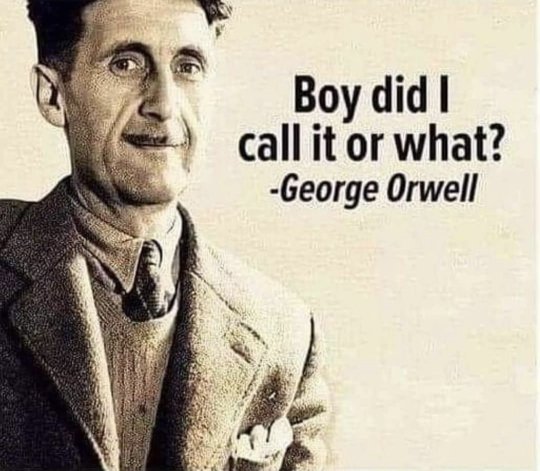
#Colin Wright#George Orwell#Orwellian#cancel culture#Nineteen Eighty Four#Community Notes#religion is a mental illness
2K notes
·
View notes
Text
I enjoy talking to you. Your mind appeals to me.
George Orwell, from 'Nineteen Eighty-Four'
699 notes
·
View notes
Text
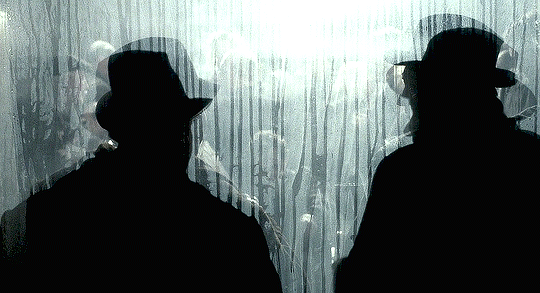


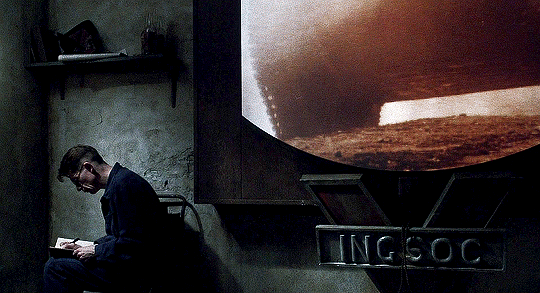

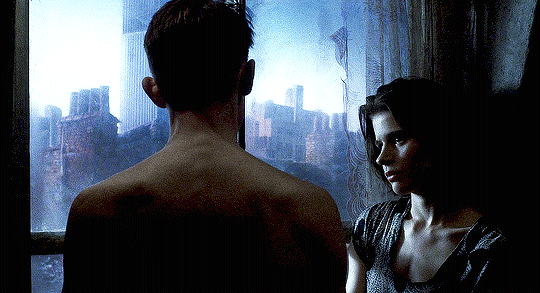
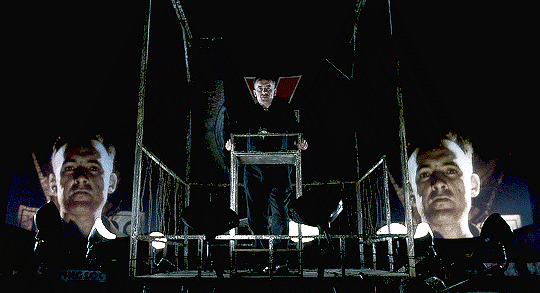

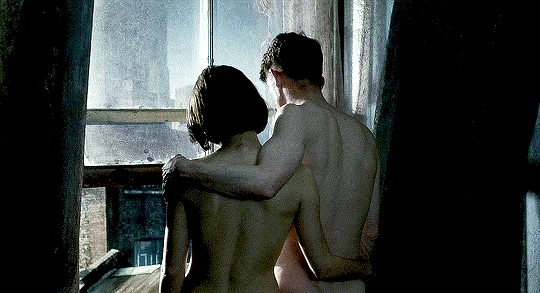
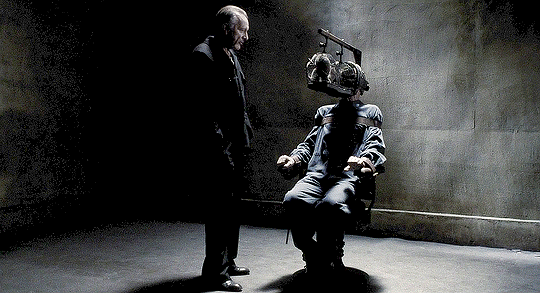


Cinematography by Roger Deakins, ASC, BSC:
Nineteen Eighty-Four (1984)
directed by Michael Radford
#nineteen eighty four#1984#roger deakins#filmedit#scifiedit#userleo#userangela#underbetelgeuse#userrobin#moviegifs#dailyflicks#userstream#userfilm#cinematicsource#chewieblog#fyeahmovies#cinematography#rd#gif#*#these are *almost* in chronological order
171 notes
·
View notes
Text
Nineteen Eighty-Four by George Orwell
Wow. There is...there is so much here.
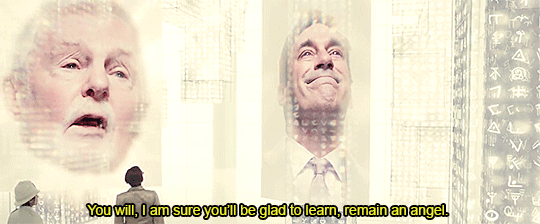
First, a caution about the book itself: there is significant sexually violent narration, and lots of torture as well. This post is going to discuss these topics only in general terms - I don't think I need to go into detail to discuss what they mean for the story - but take care of yourself when you're deciding whether to read it. If you have any questions, always feel free to send an ask or message.
I am going to need to make multiple posts about this book. For this first one, I'll focus on summarizing the book and its main themes, especially the ones that I think relate to Good Omens. As always, I can't summarize it in a way that will give you a better understanding than simply reading the book, but summarizing it will help me put my own thoughts together and hopefully help you follow along as I try to articulate them.
Because it's impossible to miss, I think it is best to confront this issue at the outset: there is a lot of especially blatant misogyny on Winston's part in Nineteen Eighty-Four. This is not meant to be a good or sympathetic thing. It is a demonstration of how messed up he is, and how messed up everyone in that society is.
The Society
The plot of Nineteen Eighty-Four is tied up very much in the story's world. The characters are at the mercy of their society in this story, much more than in most. It will make sense to describe the world first. Indeed, a massive portion of the book is just information about Oceania itself.
In the world of Nineteen Eighty-Four, the entire planet is supposedly ruled by three perpetually warring authoritarian states: Oceania, Eurasia, and Eastasia, conglomerations of Earth's former independent nations. Through the novel, it is revealed that all three states have governments that are structured in largely the same way with approximately the same quality of life for their people, and the perpetual war is itself a way of controlling each population.
Technically, we don't know for sure that the war is really happening. In fact, we don't know that anything is true, because almost all the information the characters have comes from the Party, the government of Oceania, and the Party's operations revolve around reality control. The Party's "leader" is an enigmatic figure referred to only as Big Brother, who, of course, is watching.
Our protagonist, Winston, lives in Oceania. There are Inner Party members, who are the highest-ranking, with the highest responsibility and the highest quality of life. There are Outer Party members, who work for the Party, are heavily surveilled, and whose daily needs are all provided for with low-quality supplies; they have a highly regimented daily schedule. Inner and Outer Party members have telescreens, which broadcast Party propaganda but also have cameras to monitor all Party members. It is incredibly difficult to get away from telescreens, since there's at least one in every home and they're everywhere in public. Altogether, the telescreens form a panopticon that is hard to evade.
Then there are the proles, a shortened term for proletarians, who are the lower classes of Oceania and make up the majority of the population. The proles live in poor conditions and are constantly manipulated by State-generated propaganda. However, they have more freedom than Party members, in the sense that they are also largely ignored by the Party because they have no real power and are assumed to be incapable of engaging in revolutionary behavior. For this reason, proles get to have human relationships and enjoy pleasures, wherever they can find pleasures, in ways that Party members are not allowed. In reality, the Party's perpetual war is a way of grinding through resources in order to keep people, especially the proles, buried under work without improving their quality of life. This is because when people have free time, they can use it to learn and organize, and they might become a threat to the Party.
Winston is one of the Outer Party members. He works in the government department that rewrites history. See, every time a fact or anecdote in the media is inconvenient for the Party, the Party goes back and destroys all old copies of newspapers and books, all old video content, all paperwork, any scrap of evidence that anything was different. Newspapers are routinely reprinted with "updated" (falsified) information. For example, Oceania is always either at war with Eurasia and allied with Eastasia, or at war with Eastasia and allied with Eurasia, and as far as the Party is concerned, this has never changed. Every single time Oceania's alliance changes, the newspapers are updated so that the current alignment has always been true. Every time someone becomes a disgrace to the Party, their previous deeds are rewritten.
On the surface, this sounds difficult to implement, but over the story, one realizes the vast majority of the Party's operations revolve purely around the constant reshaping of history, control of people's memories, and control of people's emotions for the purpose of maintaining power eternally. Art produced by human beings is actively discouraged; instead, the Party mass-produces art, including novels, using machines, to control what kinds of ideas people are consuming.
The Party is essentially a machine that controls reality, or at least, what the people inside it consider to be reality. There are people who specialize in managing the thoughts of the public: the Thought Police. While they may technically not be able to literally see inside one's mind, they watch everyone carefully and are excellent at noticing everything: every facial expression, every eyebrow twitch, and every breath.
The Party rules through a series of four "ministries." These are the Ministry of Truth (like an educational ministry, responsible for producing propaganda), the Ministry of Peace (like a military, responsible for warfare), the Ministry of Love (like the correctional system, responsible for jailing and torturing dissidents), and the Ministry of Plenty (like the treasury, responsible for rationing).
When it suits the Party, anyone can be "vaporized." This means they are secretly murdered and all evidence of them - any existing record whatsoever, any news story, any list or database entry - is erased.
The Party has a new language they're developing as a method of thought control called Newspeak. The purpose of Newspeak is to make it impossible to articulate certain kinds of thoughts. The following is a character named Syme describing Newspeak:
"Don't you see that the whole aim of Newspeak is to narrow the range of thought? In the end we shall make thoughtcrime literally impossible, because there will be no words in which to express it. ... In fact there will be no thought, as we understand it now. Orthodoxy means not thinking - not needing to think. Orthodoxy is unconsciousness."
It's worth noting that Syme is later vaporized, presumably just for being too insightful out loud about Newspeak. In Newspeak, people who have been vaporized, if they must ever be referred to at all, are called "unpersons." In this way, no one has ever been killed by the Party, because those people have never existed in the first place.
There's a key Newspeak word that appears over and over: doublethink. It's the ability to believe two contradictory things simultaneously, and unlike the way we usually experience cognitive dissonance, there is no urge or attempt to reconcile what is really true. With doublethink, the existence of two contradictory ideas at once is itself exploited to help Party members serve the Party.
The Party (and its equivalents in Eurasia and Eastasia) uses perpetual war to control the population by squandering the resources produced by human labor and keep people in a perpetual combination of patriotic fervor and fear. The war is infinite and can never be won; the whole purpose of the war is to be at war.
Socially, the Party has destroyed family life. Winston was married years ago. He and his wife are so estranged that he is no longer sure if she is alive. They did not have a good relationship. The Party does not want close emotional relationships between its members, so while they are strict about who is allowed to marry (not for love, strictly for procreation), they don't care if people continue to live together. However, the Party does not want people forming new relationships, so divorce and extramarital sex are also illegal. The Party has also turned children against their parents by encouraging children to report their parents' potential thoughtcrimes. All in all, family members are generally afraid of each other.
We see, over and over again, how the Party does its best to frame human beings as both inherently untrustworthy and as objects to be used. Pitting people from individual family members to entire classes, sexes, and races against each other is one of the Party's many techniques for controlling people, and it has seeped into Winston's everyday thought processes. Only actual experiences with other human beings even begin to break these ideas down.
Eventually, it becomes apparent that the Party's motivation is immortality through the denial of the individual. Human beings are denied their own personal thoughts, feelings, and bodies. Only their ability to be assimilated into the Party is permitted. Even thoughts and feelings about the greater good are unacceptable because these lead to regime changes and interfere with the raw totalitarian power of the Party. Every Party member in Oceania is meant to strive exclusively for the continued power of the Party. Dissidents are denied even the ability to be martyrs, because the Party does not kill people while they carry hatred for Big Brother; they simply change their thoughts until they are good Party members again, and then kill them later, when they are no longer dissidents and have no legacy of resistance to leave behind.
Winston's Plot
Winston has a secret desire to be free of the Party. He does get swept up in the Party's fervor when he's in the middle of it, but he also longs for the extremely basic pleasures and freedoms that have become taboo. For example, Winston secretly buys an old pen and journal to write in - a completely forbidden act that he has to conceal from the telescreen in his own apartment. He finds himself almost unconsciously writing things like "DOWN WITH BIG BROTHER" in that journal.
There is an Inner Party member named O'Brien who Winston admires greatly from a distance despite knowing only his appearance: "intelligent" with a "prizefighter's physique." Winston perceives that he and O'Brien "understand" each other somehow, and even believes O'Brien has spoken to him in a dream, saying they "shall meet where there is no darkness." Eventually, Winston imagines he is addressing his journal to the mysterious O'Brien, believing him to be an ally.
Winston has an acquaintance at work named Syme. Syme is very passionate about revising the Newspeak dictionary. However, he is a little too openly insightful about the true purpose of Newspeak for his own good. Even though Syme does not seem to have any intention of betraying the Party and in fact is extremely taken with Newspeak, Winston is convinced he will be vaporized, and sure enough, he is.
There is a woman Winston thinks he hates because she looks like the perfect Party member who would turn him in to the Thought Police. Actually, the narration outright states that he doesn't like women entirely, because he thinks they're too committed to the Party and enjoy betraying men. However, it turns out that this woman observes Winston by the shop where he bought his illegal notebook. By simply observing Winston in that shop, the Party would suspect he's committing thoughtcrimes, and Winston panics. However, the woman later bumps into Winston at work and passes him a note that says, "I love you." Winston then instantly decides he wants to be with her; the idea of not being with her never even occurs to him.
The woman's name is Julia. It turns out Julia is putting on an incredibly convincing act, but she hates the Party, too. Winston is technically married, so he can't legally marry Julia, and any kind of non-procreative sex is illegal anyway, so their relationship is entirely forbidden.
Winston and Julia meet up and have sex in secret. It's worth noting that during their first meeting, they enjoy listening to a thrush singing. During this first meeting, they go out to the countryside, where there are fewer telescreens and microphones; Winston comments that it's like the "Golden Country," his symbolic dream-place where people are free.
A man named Mr. Charrington owns the shop where Winston had bought his notebook, and he also owns a room for rent above the shop. It's an old-fashioned prole room without telescreens and with a great number of old-fashioned fixtures. Winston and Julia rent it to get away from Party life for a few hours every now and then. When they first start staying in the room, Julia observes a rat and throws her shoe at it. Winston is utterly terrified, showing that he has a serious phobia of rats; it is vaguely implied that he had a traumatic moment related to them as a child. Julia takes the rat in stride; they are everywhere. She promises to block up the hole so the rat does not return.
Julia and Winston spend time in their prole room knowing for sure that it will eventually lead to their capture, torture, and death, but they decide it will be worth it. Winston voices some interest in trying to work against the Party; Julia does not believe this is possible whatsoever, and is not interested in trying. She believes people are better off putting on a convincing act and getting away with as much as they can for as long as they can.
Meanwhile, during the workday, O'Brien speaks to Winston. He mentions Syme without using his name, which is incredibly unusual, since people who are vaporized are never ever acknowledged again; all their work is erased from history. But O'Brien mentions Syme's work on the Newspeak dictionary and gives Winston his home address so that Winston can borrow the dictionary. Party members also don't often give each other their addresses. Because of these unusual cues, Winston infers that O'Brien is inviting him over to conspire against the Party.
While Winston and Julia meet up and have sex, they also indulge in other pleasures of the world, like real coffee and chocolate, and proles singing outside their window, and art that hasn't been generated by the Party. Observing the proles and their richer emotional lives, Winston and Julia decide they are going to worry only about their feelings. The Party can coerce them to do anything, including to confess, but as long as the Party can't make them stop loving each other, they agree, they will never have betrayed each other. Julia says that for all the things the Party can do, they can't get inside their heads.
So seized are Winston and Julia by their conviction that they decide to go visit O'Brien together and confess to wanting to destroy the Party. O'Brien tells them they may join the Brotherhood, a mysterious group of dissidents working to bring down Big Brother, but they must be willing to sacrifice everything; they must be willing to not only suffer and die, but to murder civilians, to spread disease, to sow discord, to do anything the Brotherhood asks of them. They even, O'Brien says, must be willing to "separate and never see one another again." This is the only thing Julia and Winston are unwilling to agree to. O'Brien accepts them anyway and, many days later, gives Winston a book through a secret messenger.
This book contains the writings of Goldstein, the supposed leader of the Brotherhood, outlining the Party's core philosophy. Winston reads this to Julia, who is hinted to not be all that interested, but she does listen a little.
While they look out the window and contemplate that the proles are alive and the Party members are already dead, Winston and Julia are captured. It turns out Mr. Charrington was a member of the Thought Police and the room had surveillance in it. Winston and Julia are separated and dragged to the Ministry of Love.
While at the Ministry of Love, Winston spends a lot of time waiting, watching other prisoners pass through. Some of them are proles, and some of them are people he knows. The waiting room is enormous and brightly lit with telescreens on all walls. There are essentially no shadows.
Another familiar face appears at the Ministry of Love. It's O'Brien. Winston first thinks O'Brien has been captured, but it soon becomes apparent that O'Brien was masterminding this whole operation and is in charge of Winston's torture. They have, indeed, met "where there is no darkness" - because of all the telescreens and artificial lighting. O'Brien and other Party members even wrote Goldstein's book as yet another propaganda piece. O'Brien states the description of the Party in the book is true, although the book's implication that the Party can be defeated through a prole uprising is false because a prole uprising will never happen. (Note that Winston did not actually read the part of the book where "Goldstein" outlined how the Party should be defeated.)
Winston is tortured for an undetermined amount of time. He discovers that he is a prisoner of his body; his torturers can get him to say pretty much anything through punishment and reward. In fact, they can force him to feel certain ways, too. O'Brien and the Party aren't only trying to get Winston to give away information; they want him to really internalize sincere belief in the Party doctrine, like doublethink, symbolized by the concept that 2+2 equals 5.
Winston starts out promising to himself there are certain things he will never agree to or say out loud, but torture proves an effective method at getting him to say whatever O'Brien wants. Winston vows that he will recite the Party lines, but will not actually believe them. If he lies to get the torture to stop but still retains his ability to reason for himself, Winston believes, then he can beat the Party.
However, O'Brien and the torturers are slowly able to break that down, too, as they are good at reading Winston's emotions, and they torture him every time he recites their desired lines without the sincere belief they're looking for. Winston is highly resistant to the 2+2=5 idea, but as he is tortured over and over, he does come to believe that because the Party can define his reality through brute force, then 2+2=5 could very well be true. They can force it to be true. He has no choice but to believe it, because only believing it might possibly end his torture, and the torture must end.
In other words, Winston and Julia were wrong. The Party can, in fact, get inside your head.
When Winston starts to believe 2+2=5, O'Brien does indeed start to improve his treatment of Winston, providing him with food and comfort, allowing Winston to become much healthier over time. This bonds Winston to O'Brien and makes him feel attached. However, Winston has not forgotten Julia, and in an unguarded moment, he cries out for her. This prompts O'Brien to ask Winston his feelings, again, about Big Brother. Winston states that he hates Big Brother.
It is at this moment when O'Brien sends Winston to the notorious Room 101.
In Room 101, prisoners face their worst fears - which, of course, the Party knows, because they know everything about everyone. Winston, who we know has a phobia of rats, is shown a pair of cages with starving rats in them. He is told that the rats are, as everyone in this world knows, flesh-eaters, despite being rodents. Winston is restrained, his head held in place, and O'Brien informs him that the rats will be released to eat his face.
Winston realizes what O'Brien wants to hear: he realizes his torturers will probably not allow the rats to eat him if he is willing to inflict the torture on Julia instead. They want Winston's betrayal of Julia to be complete. They want him to stop caring for her, the one thing he and Julia had once agreed they would never, ever do. And Winston has reached his limit: he cannot tolerate the idea of being eaten alive specifically by rats. So Winston says, "Do it to Julia! Not me! Julia!"
And then he is finally let go.
We continue with Winston once again living on the outside. He has seen and spoken to Julia, who was also let go. But the bond between them is completely broken. Julia admits she also betrayed Winston when she was faced with Room 101.
"Sometimes," she said, "they threaten you with something---something you can't stand up to, can't even think about. And then you say, 'Don't do it to me, do it to somebody else, do it to so-and-so.' And perhaps you might pretend, afterwards, that it was only a trick and that you just said it to make them stop and didn't really mean it. But that isn't true. At the time when it happens you do mean it. You think there's no other way of saving yourself, and you're quite ready to save yourself that way. You want it to happen to the other person. You don't give a damn what they suffer. All you care about is yourself."
"All you care about is yourself," he echoed.
"And after that, you don't feel the same toward the other person any longer."
"No," he said, "you don't feel the same."
In other words, by demonstrating to Winston and Julia that they ultimately cannot escape their own self-interest, O'Brien has caused them to reject each other.
At the tail end of the book, Winston is sitting in his usual spot at a place called the Chestnut Tree Café, pondering a happy moment from his childhood before pushing the memory away, believing it to be a false memory. When an enormous military victory is announced on the telescreen, Winston realizes that he finally, truly loves Big Brother.
Interpretation of the End
Although the events at the end of the book are pretty straightforwardly described, I found them slightly confusing on an emotional level. Winston and Julia aren't really angry at each other for their betrayals, it doesn't seem - in fact, they admit to each other that's what happened, and they agree on their mutual experience. But they don't love each other anymore, and Winston loves Big Brother instead.
So, here is my initial thought on what the characters went through:
For people to love each other, both need a sense of individuality. There needs to be a connection, but there also needs to be a specific You and a Somebody to love, to connect to.
Through torture, O'Brien has effectively torn away Winston's individual sense of self. I know that's a weird thing to suggest when the book repeats "all you care about is yourself" multiple times, but I think that by so completely obliterating Winston's ability to make anything resembling his own decision, O'Brien has essentially made "Big Brother" and "Winston ('yourself')" the same person. Big Brother's wishes are Winston's wishes. Winston has been assimilated into Big Brother. Winston and Julia's conversation at the end describes what it feels like to be liquidated as a person and assimilated into a collective.
Winston now knows that the one core impulse he can never escape is self-preservation, and the only one who can provide that, with infinite military might and an infinitely-deep torture repertoire, is Big Brother. Julia represents the ideal that caused Winston to estrange himself from the safety of embracing and trusting Big Brother. And because Big Brother is both eternal and almighty, giver of both life and death, he is the only one it is safe to trust.
By betraying Julia, Winston discovered that his own will inherently had limits; because he would always, eventually, revert to self-preservation, his will and therefore his identity became synonymous with the force that decided whether to preserve him. That's why the end of the novel involves Winston imagining that he has finally been shot in the head and killed; he has experienced the death of his sense of self. And this is exactly how "Goldstein's" book indicated the Party's operations work: eliminate individuals and assimilate them into a collective to achieve immortality.
Character and Faction Parallels Between Nineteen Eighty-Four and Good Omens
The Party and Heaven and Hell
They're both the one overarching power over everyone's existence. The inner workings of it are mysterious to the characters and even moreso to the audience. The main characters are agents working for these entities, and they are controlled through surveillance, punishment, and reward.
Although Heaven and Hell give the impression of being two large overarching powers, it seems apparent to me that the whole thing is really just one system that has intentionally split its workforce into factions. Ultimately I think we will see in the most explicit way possible that whoever is actively calling the shots in Heaven is also actively in charge of Hell.
Winston and Julia, Aziraphale and Crowley
Both pairs are agents who are in love with each other even though they're not supposed to be, who enjoy Earthly pleasures and experience the joys of humanity before getting arrested and dragged away by their authoritarian "employers."
It's tempting to try and figure out which character mirrors which - Aziraphale mirroring Winston, Crowley mirroring Julia? - but I think, sort of like with Nina and Maggie, the reflections work in every direction. The characters aren't literal stand-ins for each other, but they are exploring similar themes, including what happens to people when a society forbids intimacy.
O'Brien and the Metatron
"More even than of strength, he gave an impression of confidence and of an understanding tinged by irony." This line describes O'Brien from Nineteen Eighty-Four, but it sounds quite a lot like the Metatron's manner as he enters Aziraphale's bookshop. Confidence and an understanding tinged by irony indeed.
O'Brien seems to appeal to Winston's ideal in authority figures, appealing both intelligent and physically strong. The Metatron seems to have tailored himself to appeal to Aziraphale's ideal of an authority figure: someone who is calm and in control, but also has an exceptionally gentle manner (and this isn't really true of the Metatron, but he can make it look like it is).
There are more similarities. Winston thinks and hopes O'Brien will be a helpful figure, and O'Brien convinces Winston he's a helpful figure, but in the end, O'Brien is the mastermind behind Winston's capture and torture. Additionally, Winston assumes, during his torture, that the Party's drive for power is for the Greater Good. But O'Brien tells him this is stupid, and the Party's drive for power is just for the pure sake of having power, because that's the only thing that will guarantee the Party's immortality.
This reminds me a little bit of the Metatron telling Aziraphale the point of the war is to win it, not to avoid it. It also hits me as a potential motivation for Heaven - like, why do they do what they do instead of doing something else, since the universe seems perfectly capable of running itself? "Power" or "immortality" could be a reason, and it would also be a reason that would resonate with very human themes, since power and (symbolic) immortality are among the motivations that can drive real-life authoritarians.
The Proles and Humanity
The common people. The populations who are considered by the main characters' societies to be "beneath" them, but who the main characters become fascinated by, and whose lifestyles the main characters come to prefer.
Both Nineteen Eighty-Four and Good Omens contain in their narratives the notion that the prole or human way of life is where true meaning can be experienced. Winston and Julia go as far as to announce that proles are alive and Party members are dead. And at the end of Good Omens Season 1, Aziraphale outright tells Adam that being "human incarnate" is better than being Heaven or Hell incarnate.
This mirror is probably the one that brings up the richest speculation possibilities for me. I won't go in-depth here, but I see in both stories the main characters developing this love for the proles and humans while continuing to separate from them - even trying to turn around and exploit the very power structures that have oppressed them in an effort to fight against the oppression.
It's worth noting that in Nineteen Eighty-Four, Mr. Charrington, the man who Winston and Julia rented their secret love nest from, and whom they thought was a prole, was actually a member of the Thought Police who helped capture them, whereas in Good Omens, so far, the humans have just been humans, and while Adam Young started out as an incredibly powerful non-human, he later chose to be a human and used his power to reject authoritarianism.
The Themes
Authoritarianism and Power
Obviously, the whole overarching cautionary tale in Nineteen Eighty-Four is about authoritarianism and the insidious ways it affects populations. The Party's power is almost as absolute as it can possibly be. Big Brother really is almost always watching; there is almost always a telescreen somewhere nearby. Even when there isn't a telescreen, there are microphones. And unorthodox ideas and behavior are punished with annihilation - not just death, but the total annihilation of the self.
Doesn't this sound like a version of Heaven and Hell in Good Omens?
At first glance, it appears Oceania's Party is more aggressive about surveilling its Party members than Heaven and Hell are about surveilling Aziraphale and Crowley. One has to wonder if perhaps Heaven and Hell are just as aggressive with surveillance in the Upstairs and Downstairs themselves, but are less aggressive or maybe even less capable on Earth, just like the Party's surveillance is less in the countryside (although it is still a significant threat there).
But still, we see Michael pull out those photos of Crowley and Aziraphale through the ages, and we hear the Metatron refer to reviewing Aziraphale's "exploits," and we see Hell drag Crowley down in 1827, and we see both Crowley and Aziraphale anxiously glancing around throughout history with the assumption that someone might be listening, and we see how ready Heaven is to erase Gabriel's memories (his identity! his entire self!) from existence. We also watch Heaven and Hell try to make Aziraphale and Crowley disappear in a gout of hellfire and a tub of holy water after realizing that Aziraphale and Crowley do represent a threat to the current celestial order. Heaven and Hell's Nineteen Eighty-Four-esque insidious threat is clearly established in both seasons.
Vaporizing Dissidents
In fact, Heaven and Hell's arrest of Aziraphale and Crowley reminds me a bit of Winston and Julia's arrest, in the sense that the protagonists knew what was probably coming but not exactly when. And Heaven's attempted execution of Aziraphale in particular reminds me very much of the Party choosing to vaporize a dissident. They were going to try to disappear him. No angel or demon other than the ones who were involved would have known what happened to him. Hell's attempted execution of Crowley, meanwhile, reminds me of the Party's public executions of war prisoners.
Finally, the Party will attempt to erase people from existence by killing them and then erasing all records related to them, down to the very last detail. Meanwhile, the Archangel Michael threatens Aziraphale with being literally written out of existence in the Book of Life. There's lots of speculation about how possible this is. I wonder if maybe, it's a flawed process. Maybe erasing someone from the Book of Life can cut a hole shaped like them in the universe - but maybe it isn't that simple, and they don't actually get taken from anyone else's memories. Maybe, as people in Oceania haven't quite lost the ability to remember their dead, Heaven cannot actually erase the fact of anyone.
Social Disconnection
I see a lot of complaints online about the characters of Nineteen Eighty-Four being impossible to like. What tends to make characters likable? Their behaviors toward others, especially humor, compassion, individual quirks, and affection. Their moral strengths, like a sense of justice, might appeal to us, too. And what has the Party been systematically beating out of people for decades now? Anything that could possibly make fictional characters likable.
One of the Party's primary modes of social control is to keep people from having individual, intimate relationships outside of the Party. Each individual regards every other individual with distrust at all times, and only the Party is capable of providing safety. Winston mentions many instances in which he believes parents are afraid of their children, for example. There are also a number of people who he thinks would report him for thoughtcrimes.
This is getting into heavy speculation territory, but it hits me as a major motivation for the Fall in the first place. It's a great way to instantly divide Heaven itself in half, make everyone instantly suspicious of everyone else, and set up a whole bunch of rewards and punishments to hold over people's heads related to Falling.
One thing that's obvious, though, is the total lack of social connection in Heaven. Michael and Uriel are constantly treating each other with barely-suppressed contempt. Muriel wants approval so badly, but nobody has any patience for them. The "friendliest" any angels get are Gabriel and Sandalphon in Season 1, and that's still like, corporate-coworkers-style friendliness. Gabriel outright tells Beelzebub that no one has ever given him anything. Although it's...theoretically possible Gabriel is an outlier, I think his experience is probably representative of all the angels.
Bodily Experiences, Physicality, Gross Matter
There is a moment that made a big impression on me. Winston observes a prole woman outside singing a silly popular song at the top of her lungs as she works. This woman is not an attractive person by Winston's or Party standards; she is older, she is fat, she has a "lower-class" accent, her skin is weathered and reddened from working outside. But Winston, self-admitted misogynist who came of age on the Party's feminine ideal, thinks she is beautiful. He has a moment of realization that she's beautiful because the very things that theoretically would make her "unattractive" are evidence of a human life fully lived.
We also have Winston and Julia enjoying the world through their senses together in a way that they simply cannot in the grips of the Party. From listening to a thrush in the countryside to drinking real, delicious coffee, they experience pleasures that are denied to them and cause them to feel peaceful in a way that is denied to Outer Party members. As they experience life in a way that is much closer to the ways of the proles, they decide that only proles are alive; Party members are dead. It is at the moment when they speak this out loud that the Party chooses to capture them.
There's a darker side to the bodily experiences explored in Nineteen Eighty-Four, and that's experienced in the Ministry of Love. Here, Winston and Julia discover that their thoughts and feelings are indeed controlled by their bodies. There is only so much pain a human being can withstand before they will comply with their captors just to get the torture to stop. In fact, if the Party's psychological manipulation tactics haven't worked thus far to indoctrinate the population, then the body can be used to brute-force an attitude change.
The connection to Good Omens here is obvious. Aziraphale and Crowley are just like a couple of Outer Party members who haven't experienced real pleasure before, and then they discover wine and ox ribs and music and nice clothes and all those delightful human experiences that the other angels sneer at. It seems Heaven looks down on Earthly pleasure as a morally inferior, dirty pursuit, while Hell looks on Earthly pleasure as a kind of weakness, a pathetic softness. But Earth is where Aziraphale and Crowley have found meaning. Physical existence is where they've found themselves, where they've connected with each other, and where they've connected with the stuff of the universe itself.
Memory Manipulation and Thought Policing
In Nineteen Eighty-Four, there are massive governmental departments dedicated to revising all printed records, including reprinting newspapers as needed. Private writing is also not allowed. This means that even if a Party member has a memory, there is no physical evidence of it. Even if there were physical evidence, something a person had stuffed away in a safe place, there would be another, more "official" source to prove one's personal source wrong. Of course, anyone trying to make any kind of fuss about official sources being wrong would disappear, too, so no one will even try.
Winston mentions often in his narration that he has trouble remembering large portions of his life because of the way the Party has controlled the public narrative and obscured any fact that would once have been a point of reference for him. For example, Winston estimates that the date his journal starts would be April 4, 1984, but he actually isn't certain, not even about the year, because time isn't kept track of by those dates anymore. Historical facts, like events that led to the Party's ascent to power, have been rewritten so many times that Winston can no longer know what really happened. He can be sure there was chaos in the streets, followed by violence, and then proclamations from above about what was supposedly true, but one individual human being usually can't judge the big picture of what's going on in their entire society without a relatively objective source of information for major events.
Nineteen Eighty-Four also has literal thought police, Party members who study their fellow citizens for any sign of even the most remote disagreement with Party doctrine. If someone proves to be a problematic thinker, as Winston and Julia both did, they are dragged to the Ministry of Love to be violently re-educated. Using a series of punishments and rewards, prisoners are slowly broken down until they are unable to think for themselves at all.
Although it's unclear what Heaven is like in regards to spreading information, we've got the Metatron and the Archangels literally ready to erase Gabriel's memory. In Good Omens, since it's all dressed up in Heavenly attire and the characters have their unique attitudes, it comes across as less dystopian, more quirky and fantastical. But they are fundamentally threatening exactly what is done in Nineteen Eighty-Four. And based on Beelzebub's comment about how Gabriel's memory is "all your...you," the same identity issues would be at play. To erase Gabriel's memories would be to erase everything that makes Gabriel himself - an execution by another name.
Reality As A Construct (Or Not)
The Party's stance on reality is fairly simple: human beings perceive reality, so if human perception can be altered, reality can be changed and turned into whatever the Party wants it to be. This sounds wrong because it is wrong, but people who the Party has targeted for thought control don't get to think for themselves about it, because they can't withstand the torture.
This might be Heaven's approach to reality as well. Look at how questioning is discouraged, and how the angels choose to believe whatever is most convenient for Heaven, or whatever they believe should be true ("there are no back channels").
More importantly, though, we have characters in Good Omens who actually can change reality. In particular, this is what Adam Young does - and what he actively chooses not to do for the majority of the world, in the end. He only adjusts reality enough to be allowed to make his own decision: he's not the Antichrist anymore. Otherwise, he restores the world to its state from before he ascended to power (aside from a couple of tiny little eleven-year-old-boy-ish tweaks here and there; hey, you can't blame a kid for adding a few extras of his favorite books to the world).
Proles as the saviors of society
So this one is complicated because repeatedly through Nineteen Eighty-Four, we come across this feeling from WInston and Julia that the proles have some almost mystical connection to True Humanity which Party members have lost. However, there is also the repeated assumption that the proles are incapable of revolution on their own. And in a practical sense, this appears to be true. The intellectuals of their world look down on them for it, but the truth is that just as in real life, the proles are living in poverty and are far too desperate for their basic necessities to ever gain the class consciousness needed to overthrow the Party. This is, of course, by design.
Winston goes as far as to believe the proles might possibly rise up and overthrow the Party, but he never considers working with them. He goes straight into the jaws of the Inner Party instead! This seems to be for a couple of reasons, but primarily because Winston has formed this sort of attachment to O'Brien, his Inner Party member of choice.
In Good Omens, Season 1 and the book, humans do eventually save the world. Well, Adam - technically an Antichrist - saves the world by thinking like a human and accepting humanity as his true "side."
Free Will
"Free will" as a theme really ties into humanity as a theme in Good Omens, since Earth is neutral ground between Heaven and Hell and humans aren't born to a particular Side. In Nineteen Eighty-Four, of course, the Party's goal is to eliminate free will, while in Good Omens, Heaven and Hell are looking to eliminate humanity.
Individualism Versus Collectivism
Oh there it is! There's my pet theme!
I've always argued that in Good Omens, the core of the dualism explored between Aziraphale and Crowley is individualism and collectivism, with Crowley the dedicated individualist who nonetheless would like to belong somewhere, and Aziraphale the nervous collectivist who is secretly desperate to have an identity and belongings to himself. Good Omens has already touched on the notion that working together as a collective is necessary to keep the world turning, but it's also important to preserve individuality, so we have people to keep us company and meaning to live for. I think this will come up again.
Meanwhile, Nineteen Eighty-Four explores an authoritarian and destructive form of collectivism in which human beings are not allowed to have individual interests or experiences; everything flows toward the power of the Party. Individual identity is viewed as a weakness. With that said, Nineteen Eighty-Four does consider the potential power of collectives to overcome authoritarianism.
Mortality, Immortality, and Change
In Nineteen Eighty-Four, O'Brien eventually reveals that the goal of the Party is to become immortal through collectivism. While the fate of an individual human being is always to die, the Party believes a collective that is single-minded enough about maintaining power can live forever. In that way, people who submit to the Party's power can live forever, too. One has to wonder about the real point of all this, of course. The Party regards change as its downfall. For the Party to succeed, it must keep everyone moving toward the exact same goal of maintaining power forever.
In Good Omens, many of the characters are naturally immortal, as angels or demons. They don't have to change, and Heaven and Hell don't have to change. However, existing as immortals in Heaven or Hell, not experiencing any of the things mortals do in the physical world, all seems pretty obviously pointless. Aziraphale and Crowley, and then Gabriel and Beelzebub, and then Muriel, all start to find meaning on Earth among mortals. And I think this is all yet to be expanded upon, especially with the looming Second Coming.
Where Good Omens is concerned, the notion of change as a type of death and/or death as a type of change may be important (and ties into The Crow Road by Iain Banks as well).
By coming to Earth, the immortal characters are essentially doing the reverse of assimilating with the Party or Heaven and Hell: they're discovering themselves. With self-discovery comes the risk of change - changing from who they used to be in Heaven or Hell - and the reward of meaning.
The Party of Oceania wants to assimilate everyone into the same goal of maintaining the Party's power in order to make the Party immortal. While "maintaining power" is a "purpose" of sorts for the collective, on an individual level for any specific human being, it is nihilistic, since there is no place for the individual other than ensuring the success of the Party's destruction of the individual.
Freedom in the Natural World
In both stories, we've got the notion of nature as a place of freedom. The countryside where Winston and Julia first meet up lacks telescreens, and there are fewer microphones as well, allowing them to act naturally in a way that isn't usually permitted in the city. The room that Winston and Julia rent from Mr. Charrington is also so old-fashioned that it doesn't have a telescreen; they believe themselves to be momentarily safe in their own little world there. Unfortunately, Mr. Charrington is not really an ordinary prole, but a member of the Thought Police, which allows the Party to invade Winston's and Julia's space.
Of course, in Good Omens, Earth is the ultimate place of freedom. Heaven and Hell are both awful in their ways, hyper-controlled and devoid of real meaning. It's on Earth that Aziraphale and Crowley can begin to truly live. Of course, the safe little place they create together, the bookshop, is eventually invaded by Heaven and Hell.
I'd like to leave you with a pair of quotations.
"If you want a picture of the future, imagine a boot stamping on a human face---forever. ... And remember that it is forever. The face will always be there to be stamped upon. The heretic, the enemy of society, will always be there, so that he can be defeated and humiliated over again. Everything that you have undergone since you have been in our hands---all that will continue, and worse. The espionage, the betrayals, the arrests, the tortures, the executions, the disappearances will never cease."
O'Brien
Nineteen Eighty-Four by George Orwell
Part Three, Chapter III
"If you want to imagine the future, imagine a boy and his dog and his friends. And a summer that never ends.
If you want to imagine the future, imagine a boot . . . no, imagine a sneaker, laces trailing, kicking a pebble; imagine a stick, to poke at interesting things, and throw for a dog that may or may not decide to retrieve it; imagine a tuneless whistle, pounding some luckless popular song into insensibility; imagine a figure, half angel, half devil, all human . . .
Slouching hopefully towards Tadfield. . . .
. . . forever.
Good Omens by Neil Gaiman and Terry Pratchett
#good omens#nineteen eighty four#good omens 2#good omens 2 spoilers#1984#good omens book club#long post#torture mention#sa mention
85 notes
·
View notes
Photo
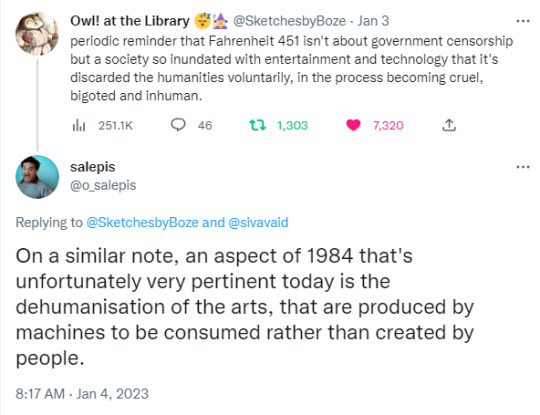
#tweet#tweets#twitter#books and literature#books and writing#books and libraries#books and authors#books and reading#1984#nineteen eighty four#fahrenheit 451#dystopian#Dystopia#AI art#AI#Society and Culture#pop culture#cultural critique#cultural criticism#technology#Entertainment#movies#film#TV#art#the arts#novel writing machine#george orwell#orwellian#orwell
943 notes
·
View notes
Text
“1984 is about [political group]” no stfu 1984 is about an aromantic man having a special interest in paper weights and razors
#nineteen eighty four#winston smith#1984#1984 book#orwell 1984#george orwell#george orwell 1984#classic literature#classic lit#aromantic#aspec#aspec community#aspec pride
158 notes
·
View notes
Text
lol imagine if classic lit characters had tumblr haha (inspired by @strangestcase)
0 notes

⚡️ alchemy-slut Follow
just successfully escaped the consequences of my own actions gonna go kiss my boyfriend to celebrate. with tongue
⚡️ alchemy-slut Follow
NEVERMINB THEY GOT MY COUSIN INSTEAD
11k notes

🧪 is-the-science-video-cute Follow
I just had to pay $13k to this lady bc i trampled her bitch ass kid who literally RAN INTO ME FIRST wtf
🧪 is-the-science-video-cute Follow
I sincerely apologize everyone!! my account was hacked and that was not me. Please ignore any posts like that in the future as I am working on getting my account secure again haha
42k notes

🌊 athenasfav Follow
This war is gonna be so easy we’ve got this fruity blond guy who’s like crazy good at spearfighting hector is fucked
🌊 athenasfav Follow
HE’S SPENT 10 YEARS SULKING IN HIS TENT AND HECTOR IS STILL ALIVE THIS MOTHERFUCKER IS NOT THE BEST OF THE GREEKS
🌊 athenasfav Follow
Well now he’s dead but at least he took like the entire trojan army down with him lol
#troyposting
132 notes

👓 rightful-conch-owner Follow
Call me piggy the way i reveal the truth through hallucinations of my severed head on a stick
5k notes

🐀 winston-deactivated19840609
She doublethink on my big brother til i eurasia
🐀 winston-deactivated19840609
DIGITAL FOOTPRINT IS REAL
#HE LPME #the consequebces #they got me
#unreality#fake tumblr post#in order of appearance:#victor frankenstein#frankenstein#edward hyde#henry jekyll#dr jekyll#dr jekyll and mr hyde#jekyll and hyde#odysseus#achilles#hector#the iliad#piggy#piggy lotf#lord of the flies#winston smith#1984#nineteen eighty four
106 notes
·
View notes
Text
"Your rebellion is between your legs,"
OH MY GOD
#1984#1984 book#1984 george orwell#1984 orwell#orwell 1984#winston smith#george orwell#nineteen eighty four#winston smith is a horn dog#julia is into it too
135 notes
·
View notes
Text
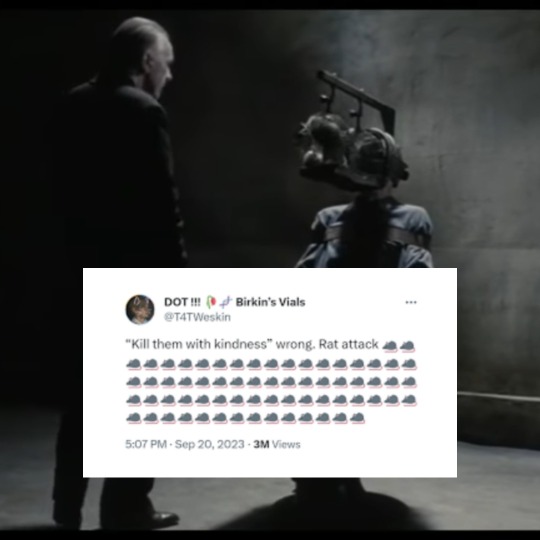
131 notes
·
View notes
Text
I wish someone loved me the way Matt Bellamy loves George Orwell's 1984
#muse#muse band#matt bellamy#nineteen eighty four#istg that man is gonna have the map of Eurasia etched on his gravestone
73 notes
·
View notes
Text
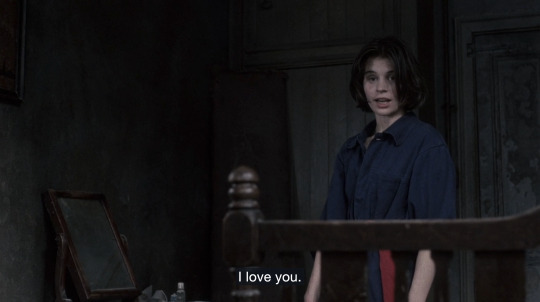

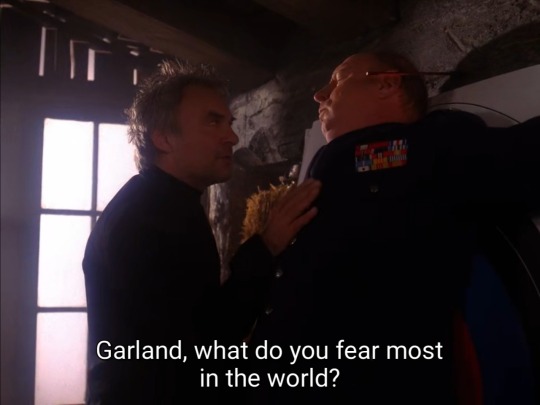

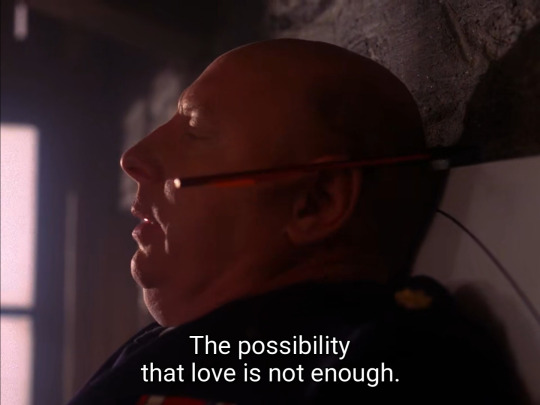
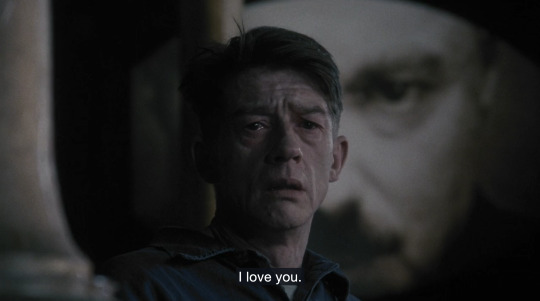
nineteen eighty-four / twin peaks, "the path to the black lodge"
#nineteen eighty four#movie: 1984#twin peaks#winston smith#julia 1984#windom earle#garland briggs#collage#web weaving
111 notes
·
View notes
Text
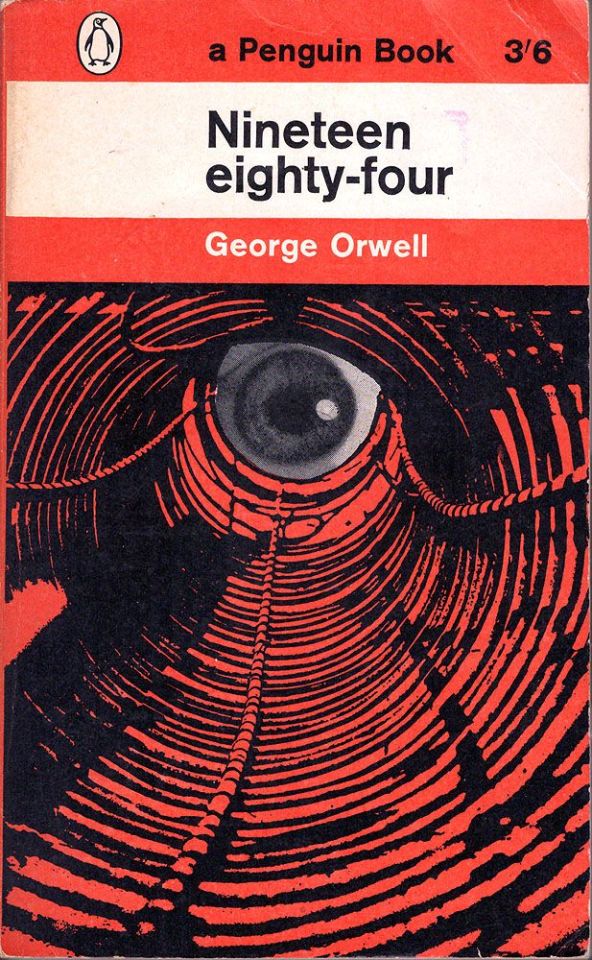
60 notes
·
View notes
Text


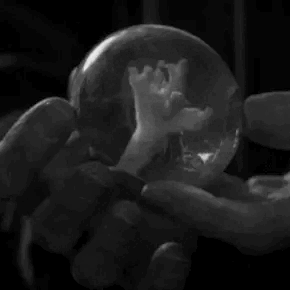
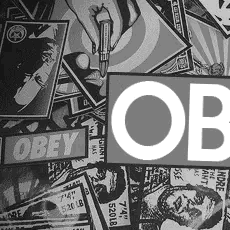
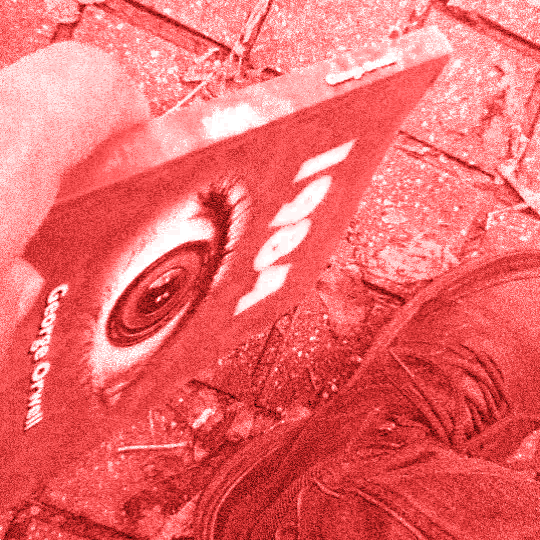
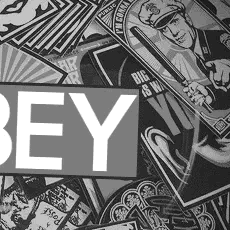
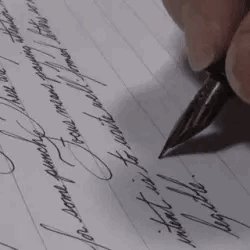

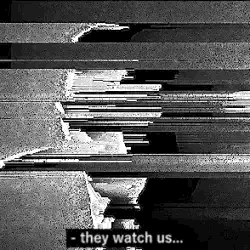
👁1984 Stimboard👁
📔📔📔|📔📔📔|📔📔📔
#1984#nineteen eighty four#orwell 1984#george orwell#1984 george orwell#george orwell 1984#1984 book#eye stim#tw eye#tw eyes#cw eye#cw eyes#writting stim#gray stim#red stim#horror stim#book stim#stimboard#stimboards
54 notes
·
View notes
Text
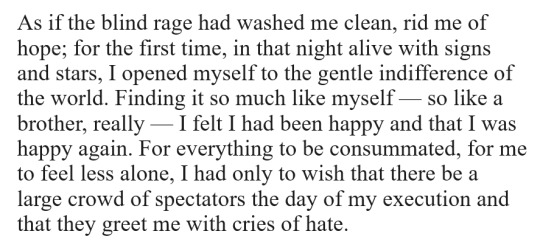


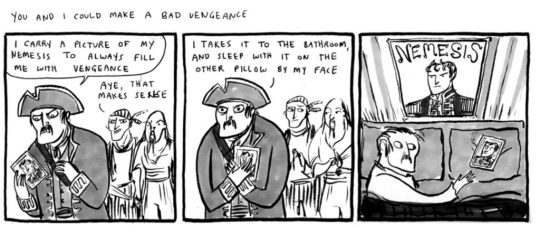


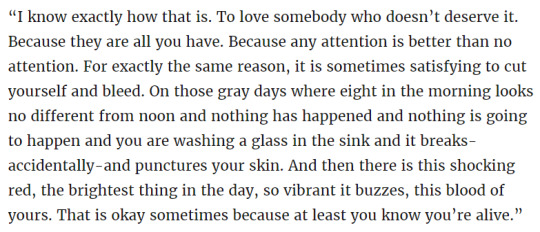



Romancing the Abject, or How I Learned to Stop Worrying and Love Others’ Hate
Albert Camus, The Stranger (1942) // The Mountain Goats, "Heretic Pride" // George Orwell, Nineteen Eighty-Four (1949) // Kate Beaton, "Hark! A Vagrant" // Mark Z. Danielewski, House of Leaves (2000) // "cringe isnt an insult" // Augusten Burroughs, Running With Scissors (2002) // my explanation preemptive apology for this post // Hermann Hesse, Demian (1919) // Pink Guy, "Fried Noodles"
#thee most toxic absurd nonsense I will ever post non-Freaks and Degenerates DNI#intertextuality#web weaving#voidpunk#dark academia#self recognition through the other#absurdism#albert camus#the mountain goats#nineteen eighty four#house of leaves#running with scissors
41 notes
·
View notes
Text
Me trying to explain that I am a "I love 1984 because it hits deep with my paranoia and messed up way of thinking by being gaslit and brainwashed by everyone around me for years" and not a "JoE BiDeN iS nOt LetTiNg mE sAy sLuRs tHiS iS LitTeRaLLy 1984!!!!" Kind of 1984 enjoyer

70 notes
·
View notes
Video
quick reminder every dystopian novel is about the present. they are not predictions of the future. they are critiques of the now.
#tiktok#dystopian#Dystopia#books and literature#books and writing#books and authors#books and reading#novels#writers#books#the future#cultural critique#cultural criticism#nineteen eighty four#brave new world#handmaid's tale#literary history#literature#histroy#fahrenheit 451
222 notes
·
View notes